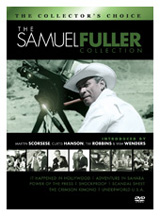I don’t know any newspaper people who don’t like a good newspaper movie. I’m not sure why this is so–do cops like cop movies? I guess we all like to see what the filmmakers get right, and what they get wrong. And I don’t mean movies where one of the lead characters happens to work at a newspaper (like Marley & Me, in which numerous scenes take place at a pre-downsized Miami Herald). I’m talking about movies where the paper itself becomes a kind of featured player.
 There used to be tons of newspaper films; it was almost a sub-genre of film noir. These older films are a special joy today, because they capture a Hollywood version of how this business was run long ago–before downsizing, or repurposing, or the Web. And now one of the greatest, Scandal Sheet, is finally being released on DVD. This 1952 film contains endless treats for anyone who ever believed, consciously or unconsciously, that a paper has a heartbeat.
There used to be tons of newspaper films; it was almost a sub-genre of film noir. These older films are a special joy today, because they capture a Hollywood version of how this business was run long ago–before downsizing, or repurposing, or the Web. And now one of the greatest, Scandal Sheet, is finally being released on DVD. This 1952 film contains endless treats for anyone who ever believed, consciously or unconsciously, that a paper has a heartbeat.
Scandal Sheet was made from a script by Samuel Fuller, who was then on the cusp of a successful directing career. Fuller was himself a newspaper man with Manhattan experience: a tabloid sense infuses all of his films. But none so much as this.
Broderick Crawford plays Mark Chapman, the new managing editor of the once dull New York Express, who has turned that starchy sheet into a wild tabloid that would stack up very nicely alongside today’s New York Post and Daily News. Gruff and arrogant, he’s determined to drive up circulation so he can get a bonus. (Ah, those were the days!) To that end, Chapman has the paper stage a dance for unmarried people from around the city: photos of these lonely hearts will make an irresistible front-page feature. All is going great until his ex-wife shows up, determined to unmask him as an imposter, someone hiding from a dark past. So he does the obvious: he kills her.
I don’t want to give away too much more of the plot. But there are numerous nice touches amid the gorgeous but gritty New York City location photography, much of it in Bowery bars and along the desolate waterfront.
And yes, there are actual journalistic lessons along the way. One of the best scenes reminds us of how common sense is a reporter’s best friend. Earlier on, Chapman has torn a lonely-hearts pin from the victim’s dress, leaving a gash in the fabric. At the morgue, a young reporter played by John Derek asks a woman: Would you ever tear a pin off your dress? Of course not, she says. No matter how much of rush she was in, she would always carefully unfasten it. So the up-and-coming reporter knows something’s fishy.
Twists and turns follow. In the end, Chapman’s love of a good scoop–and the lessons of shoe leather and never-say-die aggressiveness he taught his young protégé–do him in. He wants to get the story of the arrest so badly that he almost doesn’t care that he’s the criminal. Circulation goes through the roof, hitting 750,000 (ah, those were the days!) as the credits roll.
Reporters are not sympathetic characters in Scandal Sheet: they lie to grieving relatives, and offer bribes to smarmy public officials. Editors are worse. Perhaps the good old days weren’t so good. But when those inky presses start spitting out copies of the New York Express, it’s sure to quicken the pulse of today’s most proper, respectable, Web-savvy and restrained journalist.
A Humphrey Bogart vehicle from two years earlier, Deadline USA, remains the Great White Whale of old-time newspaper films. It has never been released on VHS or DVD; pirated copies are traded eagerly on the Internet. I saw it last year at a film noir festival in San Francisco, and if it’s ever issued on DVD I’ll snap it up. Yet there was too much moralizing, too many lessons, too many Bogart monologues extolling the virtues of the press. Nah, for my money, Scandal Sheet–with its down-and-out bums, conniving reporters and murderous editors–is the one to watch.
Scandal Sheet was released on October 27 as part of “The Samuel Fuller Collection,” a seven-DVD set from Sony Pictures Home Entertainment. It includes a second newspaper film written but not directed by Fuller, the 1943 oddity Power of the Press, about a country editor who becomes editor of an isolationist Manhattan daily. The set retails for $79.95. The discs are not available separately.
Click here for a complete Page Views archive.
Wendell Jamieson is city editor of The New York Times.
